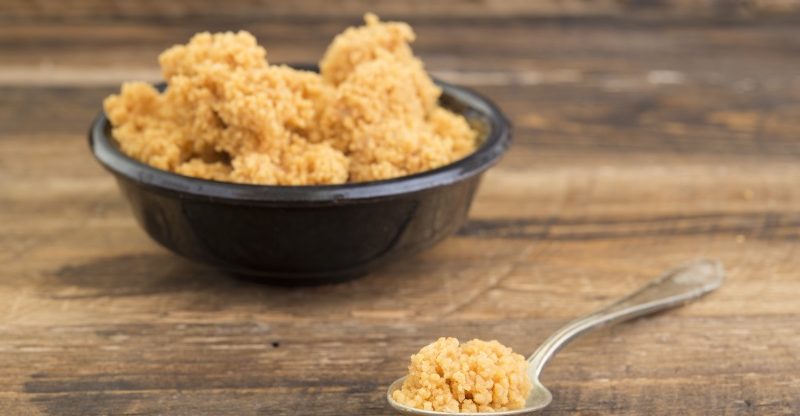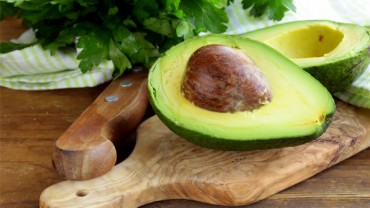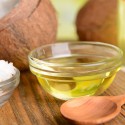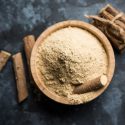13 Evidence-Based Benefits of Lecithin
Most people think that completely avoiding fats is the key to good health.
However, what we are now learning about optimal nutrition is that not all fats are bad and that some fats can even protect and improve our health.
Lecithin is a naturally occurring fat that is found in many plants and animals.
When it is used appropriately, it can have many benefits for your health.
If you are interested in natural, healthy fats that help you balance your cholesterol and improve your liver function, then keep reading to learn how lecithin could improve your health.
What is Lecithin?
Instead of being one thing, lecithins are actually a group of fatty substances that are commonly found in many plant sources, including soy and sunflowers.
Lecithins are phospholipids, which are necessary for both the structure and function of cell membranes.
This is why our bodies need them (1).
In food products, lecithin stabilizes fat particles, increasing their shelf life and giving them some food texture.
It is often used in foods, because it has the ability to find fats and water together, improving the “mouth feel” of many different things we like to eat (2).
Lecithin is composed of fatty acids, choline, phospholipids, triglycerides, glycerol, glycolipids, and phosphoric acid.
Most of the lecithin used in foods now comes from soybeans.
However, it is also found in other sources, including rapeseed, milk, cottonseed, and marine substances.
Most lecithin products for consumer use are sold as liquids, but you can also buy lecithin granules.
The largest users of lecithin are commercial food manufacturers, who rely on this fat to emulsify fats with water in various products.
It can be found in medicines, supplements, and processed foods.
It helps to bind these components together and to improve the texture of various foods.
Lecithin supplements are gaining popularity, as we learn more about the health benefits of this compound.
Taking lecithin supplements provides your body with a complex mixture of necessary phospholipids, which your body needs for energy storage and cellular function.
The two most important components found in lecithin are phosphatidylcholine and phosphatidylserine.
When you take phospholipids, like those in lecithin, you provide your body what it needs to replace damaged cell membranes and also restore the function and structure of your body’ cells.
Lipid replacement therapy, which involves taking fat supplements, can help reduce diabetes symptoms, protect you from chronic and degenerative disorders, improve your metabolic function and reduce symptoms, like fatigue.
Phosphatidylcholine is a primary type of choline, that is used in cell membrane communication.
It is produced naturally in the liver, where it is converted into choline, which is then used throughout your body.
It is found in highest concentrations in our brains, but it is part of all animal cells.
Natural Sources of Lecithin
While you can find lecithin as a food additive or in supplement form, it is also present in many natural food sources.
Some excellent plant-based sources of lecithin include brussels sprouts, broccoli, legumes, soybeans, cauliflower, nuts, and vegetable oils.
Animal-based sources of this lipid include milk, dairy products, egg yolks, fish, chicken kidneys and livers, pork and beef liver.
Soy Lecithin’s Nutrition
Soy lecithin is a type of essential fatty acid that is naturally found in soybeans.
It is extracted using a chemical process that involves the use of solvents, like hexane.
The processed oil is separated from the remaining particles and usually dried.
One ounce of soy lecithin contains nearly 30 grams of fat, of which about 1,500 milligrams are omega-3 fatty acids, and about 11,000 milligrams are omega-6 fatty acids.
It is also an excellent source of Vitamins E and K, as well as choline.
There has been considerable information about soy in the news lately.
It is, therefore, vital to address these concerns in this discussion of lecithin.
This is because most of the lecithin that is available today comes from soy.
While soy lecithin is extracted from the soybean, it only has minute traces of soy after it has been processed.
If you have allergies to soy, it is unlikely that consuming soy lecithin will cause a reaction.
Most people with soy allergies are sensitive to the proteins in soy, and since lecithin only contains the fats, the allergy risk is minimized (3).
At this time, there is no recognized dosage recommendation for soy lecithin or other lecithin supplements.
Most people take between one-half and two grams per day (4).
The largest doses studied by researchers are up to 25 grams per day (5).
Lecithin’s Health Benefits
There are many ways that taking lecithin can improve your health and help you treat and prevent disease.
Lecithin has been shown to play a role in protecting the heart and brain from chronic diseases, and it can help to address problems with your liver, digestive system and even treat mental health disorders.
Lecithin has shown promise in other areas, including cancer treatment, preventing osteoporosis, helping your skin and reducing the symptoms of menopause.
The following section will describe how medical research is constantly learning about the benefits of lecithin for your health.
Lowers Cholesterol Levels
Reducing your total cholesterol levels can improve your heart health and reduce your risk for a heart attack or of developing heart disease.
Taking soy lecithin could help you to lower your cholesterol, thus improving your heart health.
Researchers have found that patients with high cholesterol who take 500 milligrams per day of soy lecithin show reductions in both total cholesterol and LDL or ‘bad” cholesterol levels.
This reduction was significant (6).
Soy lecithin can also stimulate the production of HDL or “good cholesterol by the liver (7).
This type of cholesterol is necessary for removing dietary lipids from the blood.
Having higher levels of this compound can protect your heart from stroke or heart attack.
If you want to enjoy the benefits of soy lecithin for your heart, you should consider adding sources of soy protein to your diet.
This is because additional compounds found in soy, but not in lecithin, can help to lower cholesterol and protect you from heart disease (8).
Taking soy lecithin could also offer other protective benefits for the heart.
One study found that, in addition to lowering cholesterol levels, a diet including lecithin was able to reduce blood glucose levels, improve triglyceride levels and lower systolic blood pressure, all of which contribute to heart disease risk.
Because some people do not digest soy well or may be allergic to it, taking soy lecithin to improve heart health can be an effective alternative to consuming whole soy products.
Enhances Your Stress Response
Lecithin may help your body to improve the ways in which it responds to and resists the effects of stress.
One of the compounds found in lecithin, phosphatidylserine, is known to influence specific stress hormones known as an adrenocorticotropic hormone or ACTH, as well as cortisol.
Phosphatidylserine can reduce the response your body has to physical stress brought on by these hormones, thus affecting how stress influences your body.
In one study, participants were divided into groups who each received a different amount of lecithin supplementation each day or a placebo.
The group that took 400 milligrams per day showed a lowered response to stress, compared to the placebo group (9).
This research revealed that this particular dose was most effective at blunting levels of serum ACTH and cortisol.
Participants later noted lower levels of stress on a psychological evaluation tool known as the Spielberger State Anxiety Inventory stress subscale.
More research is needed, but this study holds the promise that lecithin could prove to be a natural treatment for many different stress-related disorders in the future.
Protects Your Liver Health
Your liver is a particularly important organ for your overall health.
It is the single largest filter of your blood.
It produces important bile salts that help break down fats and keep you healthy.
Lecithin could be helpful in preventing several liver diseases and conditions which interfere with its healthy functioning.
For example, lecithin may help with cholestasis, a type of liver disease which occurs when damaged or inflamed bile ducts slow the flow of bile from the liver to the duodenum.
In animal trials, subjects had less liver damage from cholestasis, when taking a diet supplemented with soy lecithin (10).
Choline deficiency can also lead to liver damage or even liver failure.
The choline that is found in lecithin could prevent this deficiency, allowing the liver to effectively breaks down fats, preventing the formation of fatty liver tissue (11).
Another important function of the liver is to produce bile, which is stored in the gallbladder until it is used to break down the fats, like cholesterol, in our diet.
When your liver produces too much bile, the bile salts can digest fatty cell membranes instead of blood lipids, leading to cellular damage.
Lecithin binds to bile salts and effectively reduces their levels, protecting cell membranes from excess damage (12).
Enhances the Absorption of Medications
There are some controversy and need for more research in the area of enhanced drug absorption.
This is because it is important to ensure that people are not getting too much medication or suffering from adverse reactions to large doses.
However, if you are taking medicines that are not being adequately broken down and absorbed by your body, then increasing this mechanism could also help you to reap the rewards of your medications (13).
Lecithin can help enhance the absorption of some medications because it helps to transport fat-soluble compounds across cell membranes, which are fat insoluble.
When taken with lecithin, some supplements have been shown to be better absorbed by cells, including green tea, curcumin, grape seed and silymarin (14).
With more research, we might also understand how lecithin could be used to help enhance the effects of other medications.
Provides Neuroprotective Benefits
The compounds found in lecithin may be able to supply protection for your brain, which can help treat and possibly prevent neurodegenerative disorders in the elderly.
The choline found in lecithin is necessary for effective neurotransmissions.
Eating a diet that has choline can help prevent memory loss and help those with Alzheimer’s and other forms of dementia.
It is believed that choline works by improving the functional pathways of the brain, increasing the efficiency and efficacy of messages sent along neural pathways.
For example, the phosphatidylserine found in soy lecithin, when blended with phosphatidic acid, was able to produce improvements in cognition, mood, and memory in 72 elderly patients during a three-month period (15).
This same mixture produces excellent results in Alzheimer’s patients, improving mood, general function and daily activity (16).
Many medications that are used to treat mental disorders, can produce a type of movement disorder known as tardive dyskinesia.
This condition produces involuntary movements that lead to jerky movements and can impair the ability to walk or engage in regular activities.
Soy lecithin was able to reduce these types of symptoms in one study (17).
Further research into the effects of lecithin on diseases like dementia is needed, as one meta-analysis reported only moderate improvements with lecithin supplementation (18).
Helps with Mental Problems
Lecithin may hold promise for the treatment of mental health disorders like panic disorders, mania, bipolar disorder and other forms of depression.
This is largely due to the concentration of phosphatidylinositol, a natural phospholipid.
Results using lecithin to treat panic and mania disorders have been successful.
A drug containing phosphatidylinositol was effective at reducing the frequency of panic attacks for some patients (19).
It was also helpful in treating patients with mania, yielding significantly better results in nearly all patients studied (20).
In a meta-analysis on the various complementary and alternative medicines that are used to treat bipolar disorder, lecithin was shown to be an effective option for many people with this disease, especially children (21).
In one study, phosphatidylcholine supplements were helpful in reducing insomnia, mania and bipolar symptoms (22).
Reduces Your Breast Cancer Risk
Lecithin supplementation may be able to reduce the risk of breast cancer.
This benefit may be due to the phosphatidylcholine found in soy lecithin, which converts to choline when ingested.
A 2011 study showed that those patients who took lecithin treatments had a lowered rate of developing breast cancer (23).
While the results of this study were inconclusive, the researchers did call their findings “hypothesis-generating” for future research studies.
The results were most promising in postmenopausal women.
Enhances Your Immune System
Lecithin could support your immune system to work more effectively and provide you with more protection from disease and illness.
In an animal trial using diabetic subjects, those taking a daily supplement of soy lecithin showed significantly higher activity in their white blood cells.
Even more dramatic results were noted in non-diabetic animal subjects, including both B and T white blood cells (24).
Treats Inflammatory Bowel Diseases
The phosphatidylcholine found in lecithin makes up nearly three-quarters of the lining of your intestines.
This protective layer of mucus is also home to the helpful microbiome that allows for proper digestion.
When this lining is damaged or weakened, your digestive health is compromised, you are more likely to suffer from inflammation and you are prone to developing many diseases.
Colitis is an inflammatory disease that affects the bowels.
Inflammation irritates the colon lining, creating unpleasant symptoms such as diarrhea, constipation, and nausea.
Researchers have noted that colitis often results in reduced phosphatidylcholine, impairing the proper function of the intestinal lining and allowing bacteria to cause inflammation in this sensitive tissue (25).
Supplementing with lecithin can help protect your mucus lining and lower inflammation, reducing your colitis symptoms (26).
Lecithin supplementation can also lower inflammation in those without ulcerative colitis, so using this treatment could hold promise for treating irritable bowel syndrome, Crohn’s disease, and other digestive disorders.
Improves Breastfeeding
For those women who suffer from recurrent plugged milk ducts, lecithin supplements may be able to help.
While using lecithin will not treat or unclog an actively plugged duct, it can help to decrease the viscosity of breast milk, resulting in fewer plugged ducts in the future.
If you have an actively plugged duct, you should treat it using warm compresses, massage, pumping and draining the breast entirely.
Talk with your lactation specialist about other treatment options (27).
Protects and Moisturizes Your Skin
Because of its ability to serve as an emollient, lecithin is often used in skin care products.
It can help restore moisture levels to skin and support hydration.
Supplementation of lecithin could lead to improvements with acne or eczema, but more clinical research is needed to confirm these results.
Strengthens Your Bones
Some recent research shows that lecithin could be used as a treatment for preventing osteoporosis.
Soy contains isoflavones known as glycosides, which lead help to restore and enhance bone growth and tissue preservation.
One study showed that consuming soy products can help to lower the incidence of hip fractures (28).
Taking lecithin or eating soy has the potential to lower the rate of bone loss and while decreasing your risk of a fracture, but more evidence is needed to determine if these results are limited to whole soy or also include the use of lecithin.
Helps with Menopause
Taking soy lecithin supplements could also help women who are dealing with the symptoms of menopause, by reducing blood pressure levels and restoring vitality.
In a 2018 study, women taking a high-dose of lecithin (1,200 milligrams per day) showed the most benefit and enjoyed less fatigue, lowered diastolic blood pressure and improved blood flow (29).
More research is needed to determine the long-term effects and whether lower doses could be as effective.
Precautions
Because soy lecithin is extracted from soybeans, there is some concern that it may induce allergies in those with sensitivities to soy.
Researchers have found that soy lecithin presents only a minimal risk to those with this allergy, resulting in only minor reactions in a very low percentage of the population (30).
Other studies have shown more serious reactions, so those with soy allergies, especially young children, should be cautious using lecithin-based products, such as supplements (31).
One study cautions that a daily dose of soy lecithin increased the platelet adhesion found in participants’ blood, leading to increased blood cell clumping.
Platelets help to stop bleeding and repair damaged vessels and arteries, and increased clumping of this kind increases your risk of heart diseases (32).
Ingesting high levels of soy products, including soy lecithin, could lower male sperm count and create male hormonal imbalances.
Soy contains phytoestrogens, which can interfere with the natural production of male sex hormones (33).
Because lecithin is high in choline, it should be used with caution during pregnancy.
In animal trials, supplements containing lecithin were shown to result in behavioral problems and even biological defects (34).
Side Effects
The most common side effects of taking lecithin supplements include dizziness, stomach pain, nausea, and diarrhea.
Some users report a mild headache.
Interactions
There are currently no known documented drug interactions for taking lecithin supplements.
Because this supplement can cause higher levels of blood clotting, though, it could interfere with the effectiveness of blood thinners, including over-the-counter and prescription medications (35).
Conclusion
As we learn more about the effects and benefits of lecithin, this supplement could be used to help treat and prevent many different ailments and diseases.
The current evidence suggests that lecithin is helpful in protecting the heart and the brain.
It can also help you treat diseases like ulcerative colitis and mental health disorders, while also improving your liver health and protecting you from certain kinds of cancer.
The benefits from lecithin come from its high concentration of healthy fats, which are necessary for the proper function and formation of cell membranes.
Today’s supplemental lecithin comes mostly from soy, which can cause allergic reactions in those who are extremely sensitive to this food.
Therefore, it should be used with caution.
FDA Compliance
The information on this website has not been evaluated by the Food & Drug Administration or any other medical body. We do not aim to diagnose, treat, cure or prevent any illness or disease. Information is shared for educational purposes only. You must consult your doctor before acting on any content on this website, especially if you are pregnant, nursing, taking medication, or have a medical condition.
HOW WOULD YOU RATE THIS ARTICLE?





